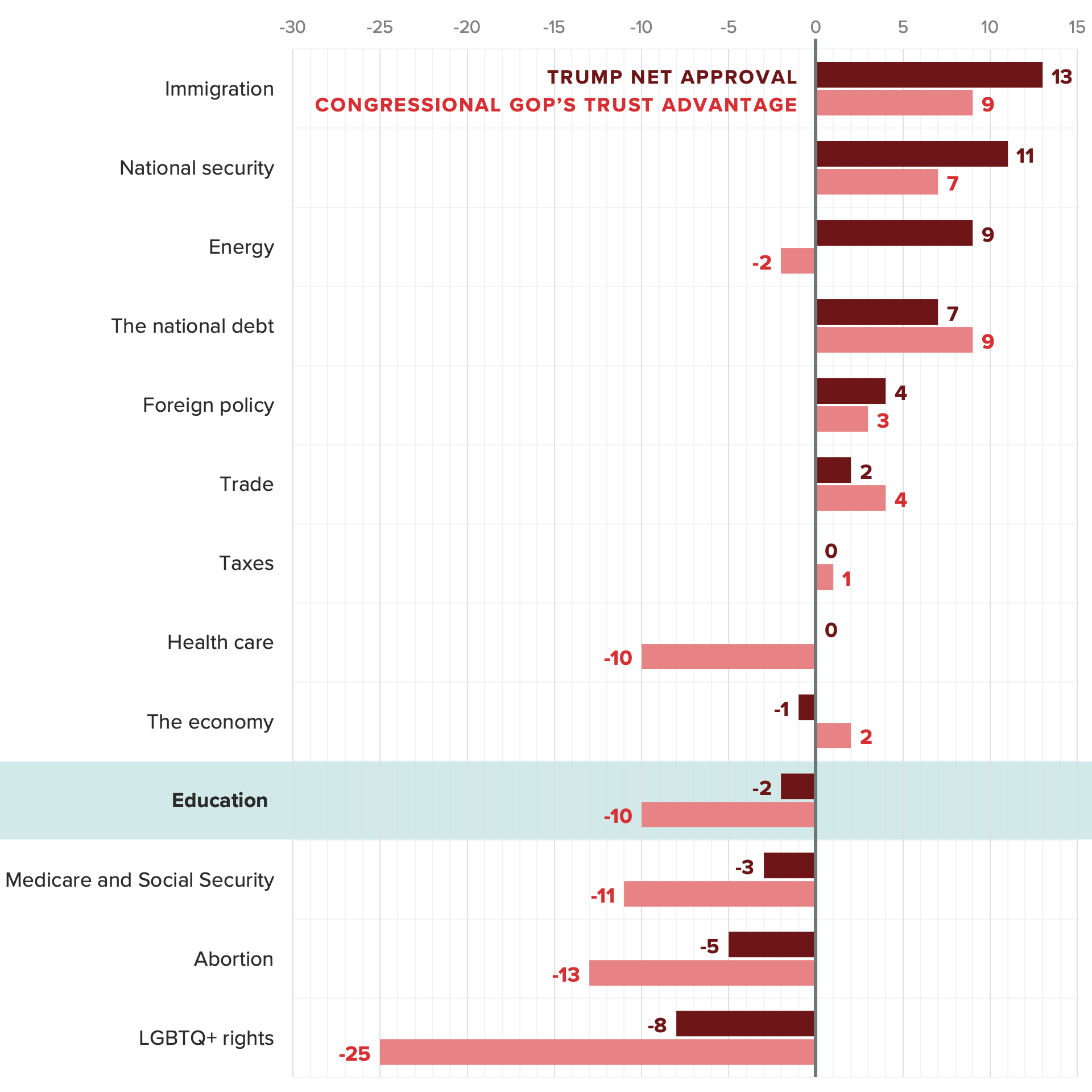Trump’s Move to Dismantle the Department of Education Is Among His Most Unpopular Yet

Key Takeaways
50% of voters disapprove of Trump’s executive order that moves to eliminate the Department of Education, ranking it among his most unpopular actions since taking office in January.
However, Americans are not especially perturbed about his administration’s aggressive approach to higher education via funding and investigative levers, such as its pressure on Penn over transgender athletes or Columbia over pro-Palestinian protests.
As our data and the early reactions to these administration moves show, schools reliant on federal funding will need to pick their battles with the Trump administration carefully or seek to dramatically increase state and private funding to make up for the losses Trump has proven he’s willing to inflict.
Data Downloads
Pro+ subscribers are able to download the datasets that underpin Morning Consult Pro's reports and analysis. Contact us to get access.
President Donald Trump’s move to shutter the Department of Education is one of his most unpopular actions in office so far. But fewer voters are resistant to his targeting of colleges and universities for their approaches to a range of cultural flash points.
Morning Consult’s latest survey shows 50% of voters disapprove of Trump’s executive order that moves to eliminate the Department of Education, ranking it among his most unpopular actions since taking office.
Among more than two dozen actions tested since January, only Trump’s moves to eliminate a Biden administration order designed to lower prescription drug prices and pardon roughly 1,500 participants of the Jan. 6 Capitol attacks drew a larger percentage of disapproval among voters.
How voters feel about the Trump approach to educational institutions

Almost 4 in 5 Democrats, as well as majorities of independents and Americans with at least a bachelor’s degree, disapprove of the move. Roughly 2 in 5 voters (38%), including almost 7 in 10 Republicans, approve of the order, which aims to accomplish a more than 40-year conservative goal.
However, as the public rejects Trump’s plans to eliminate the agency that was established by Congress in 1979 and serves largely as a funding conduit for schools, Americans are not especially perturbed about his administration’s approach to higher education.
For example, more voters than not approve of Trump’s move to slash funding for the University of Pennsylvania and Columbia University due to their respective approaches to transgender sports participation and handling of alleged antisemitism on campus.
There is also plurality backing for probes into campuses that partner with “The PhD Project,” which the Trump administration says uses race-based preferences in academics or scholarships, and half of voters support investigations into what the Trump administration calls antisemitism on the campuses of 60 U.S. universities and colleges — including nearly a third of Democrats.
But despite voters’ posture toward colleges and universities, they are largely divided on Trump’s approach to education — and they’re even further out of sync with Republicans in Congress.
Trump, Republicans in Congress lack voter confidence on educational issues

Our latest survey showed 45% of voters approve and 47% disapprove of Trump’s overall handling of education, while they’re far more likely to trust Democrats in Congress with the matter than they are Republicans (49% to 39%), in line with their posture ahead of the 2024 election.
The bottom line
Trump’s efforts to eliminate the Department of Education are a long shot. To do so entirely would require congressional action, and Republicans in Congress lack much trust or support from the American people on the matter to credibly advance this effort.
But the administration has enormous authority over grant funding, and to wield its investigative powers to make things uncomfortable for schools, which the first two months of Trump’s term show they’re willing to use. And on that matter, the White House faces much less public opposition, underlining some success in efforts to undermine the credibility of higher educational institutions with the electorate.
In turn, some schools are relenting to the pressure. Columbia has agreed to overhaul protest policies and educational programs to appease the administration, and others have cut ties with “The PHD Project” out of fears of retaliation.
As these initial reactions to the administration’s moves and our data show, schools reliant on federal funding will need to pick their battles with the Trump administration carefully or seek to dramatically increase state and private funding to make up for the losses Trump has proven he’s willing to inflict.
Eli Yokley is Morning Consult’s U.S. politics analyst. Eli joined Morning Consult in 2016 from Roll Call, where he reported on House and Senate campaigns after five years of covering state-level politics in the Show Me State while studying at the University of Missouri in Columbia, including contributions to The New York Times, Politico and The Daily Beast. Follow him on Twitter @eyokley. Interested in connecting with Eli to discuss his analysis or for a media engagement or speaking opportunity? Email [email protected].